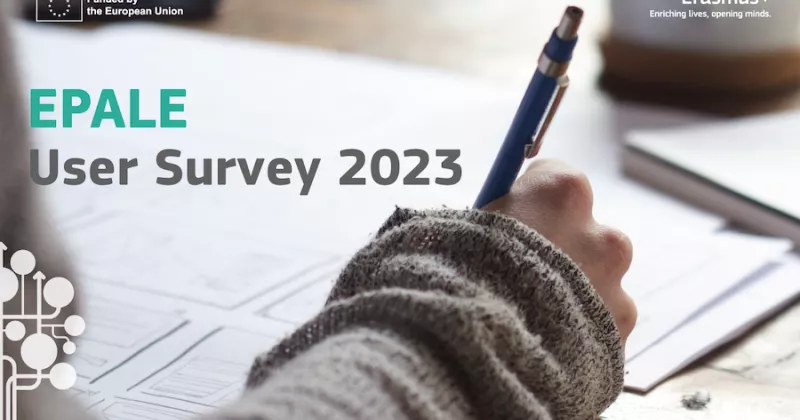Memories - About ageing, adult education and the brain

Recently, I have become more forgetful. I admit, there have always been certain areas where I have been scatterbrained – I once left home to go to Portugal without my wallet, i.e. without any means of payment. In other areas, I have had no problems, which has served me well at work. Alas, no longer. E-mails remain unanswered because I believe I have already answered them. I forget things even if they are on my to-do list. Is this a consequence of getting older? I wanted to find out more about the ageing brain and memory, so I did some online research. I concentrated on "official" websites, i.e. health and science organisations, libraries and national institutes. Admittedly, a lot of it I did not understand, my knowledge of neuroscience is more than limited. Nevertheless, the scientific basis for humans’ memories and their connection to learning is extremely important for ageing societies.
Neuroplasticity - the brain as a muscle
Let me start with a term that I learned from a speech by a neuroscientist, who was indeed speaking about older people and learning: neuroplasticity.
Neuroplasticity refers to the brain’s ability to change, or learn, throughout life as a result of practice or experience. This is what makes biological systems unique and adaptable. These changes do not only support critical steps in brain development but also refer to neural reorganisation across the lifespan as a result of learning and memory consolidation processes in normal and pathological conditions. (KU Leuven Brain Institute, Neuroplasticity, learning and memory)
In the past, it was believed the brain is formed in childhood and adolescence and then would be stable in adulthood. However, rather the opposite is true. In fact, the brain is not fully formed in childhood or adolescence. The reality is that the development of our brains is a product of both our genetics and our learning and experiences. It is important to understand that the term "biological" does not imply a fixed, predetermined outcome. Rather, our brains undergo continual changes throughout our lifespan, sculpted by the experiences we encounter and the knowledge we acquire. So a huge part of this brain development involves the altering of the connections between neurons, especially making stronger those pathways between neurons that are frequently used. Like a muscle!
The question of how the brain deals with memory and learning is - as I have learned - a key question in neuroscience. Universities and research institutes are working on different levels, from medical to behavioural perspectives (and their connections).
The University of Leuven too, states that the concept of Neuroplasticity challenges the old belief that our brain matures during adolescence and then remains fixed as we age. They also support the idea that our brain keeps evolving and changing throughout our entire life, even when faced with challenges like diseases. This discovery has led to an exciting blend of research, bringing together the fields of neurosciences and behavioural sciences. Scientists now are even delving into the dynamic changes happening at the smallest levels of our brain, like synapses, and follow the transformation of neural pathways and whole brain networks. They explore everything from the tiniest molecular mechanisms to the complexities of systems, both in animals and in humans.
In that way, embracing neural plasticity opens up new possibilities and shows how our brains continue to adapt and learn in extraordinary ways. It challenges old assumptions and offers hope for groundbreaking interventions that can enhance brain health and cognitive abilities throughout our lives. By nurturing this vibrant field of research, we can uncover the secrets of brain resilience, unlocking new frontiers in understanding neurological conditions and overall well-being.

What does it all mean for adult learning and education?
Ross Cunningham, the author of the article for UNESCO Neuroplasticity: How the brain changes with learning, comes to the implications that our brains are designed to keep learning, not held back by biology. Throughout life, our brains remain flexible and ever-changing, thriving on new experiences. It is not only about genetics; our "smartness" also relies on the intricate connections formed by our learning adventures. So learning is naturally an everlasting process for our brains.
As we go through daily life, tackling tasks, solving problems, and facing challenges, specific pathways in our brains grow stronger, which enhances our habits, reinforces memories, and improves our skills.
The same is true for consciously engaging in learning through practice and training - the principle of strengthening connections remains the same. Cunningham also suggests that meaningful learning involves building connections between related concepts rather than rote memorization. This approach unleashes the full potential of our brain's adaptability, unlocking the true essence of profound learning.
This means that the belief that "one is never too old to learn" is indeed based on neuroscientific evidence. The second point corresponds to the concept of informal learning and its importance. The third point, referring to formal education, is less of an issue for non-formal adult education, but should still be kept in mind. I have found a study that looked at two different forms of learning and their impact on memory and the brain.
We examined the impact of sustained engagement on cognitive function in older adults using multiple control conditions, building on a distinction between productive engagement versus receptive engagement. These two types of engagement are differentiated by the cognitive operations they involve. Productive engagement refers to activities that require active learning and sustained activation of working memory, long-term memory, and other executive processes. In contrast, receptive engagement refers to activities that rely on passive observation, activation of existing knowledge, and familiar activities, rather than the acquisition of novel information and engagement in cognitively challenging tasks. (Park DC, Lodi-Smith J, Drew L, Haber S, Hebrank A, Bischof GN, Aamodt W. The impact of sustained engagement on cognitive function in older adults: the Synapse Project. Psychol Sci. 2014 Jan;25(1):103-12.)
Productive engagement had quite an impact on cognitive functions, while receptive engagement had little to no effect. This can definitely inform the learning of adults, especially older ones. Other research concerns adult education and how it can have an impact on older learners. Thus, studies focusing on various participatory arts like music, theatre, dance, and creative writing have shown significant promise in enhancing the quality of life and overall well-being of (older) adults. These endeavours have been linked to improved cognitive function, memory, self-esteem, stress reduction, and increased social interaction. The US National Institute of Ageing (NIA) recognizes the importance of further research in this field and is actively exploring new research designs and measurements to establish the effectiveness and cost benefits of arts interventions.
Forgetfulness - no thank you!
If I now return to the beginning of this post – what can I do against my forgetfulness? The National Institute of Ageing (a US governmental institution) has the following recommendations:
-
Follow a daily routine.
-
Plan tasks, make to-do lists, and use memory tools such as calendars and notes.
-
Put your wallet or purse, keys, phone, and glasses in the same place each day.
-
Stay involved in activities that can help both the mind and body.
-
Volunteer in your community, at a school, or at your place of worship.
-
Get enough sleep, generally seven to eight hours each night.
-
Exercise and eat well.
-
Prevent or control high blood pressure.



